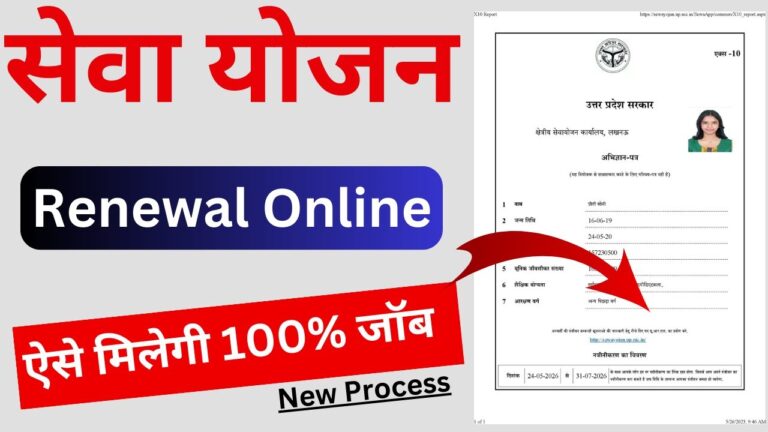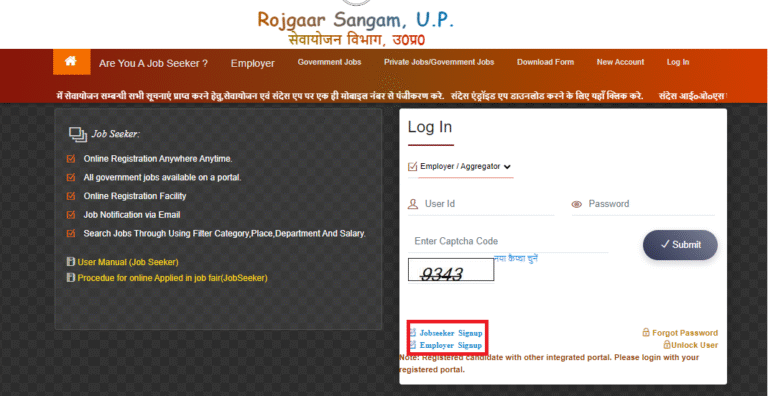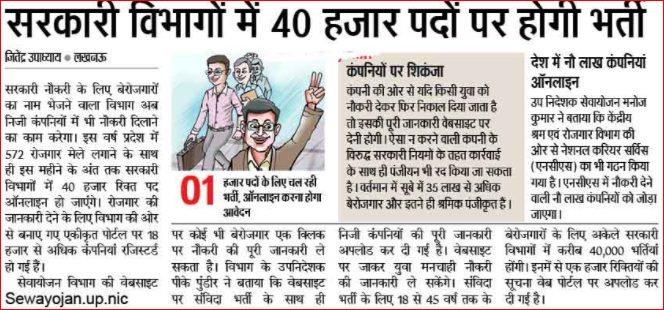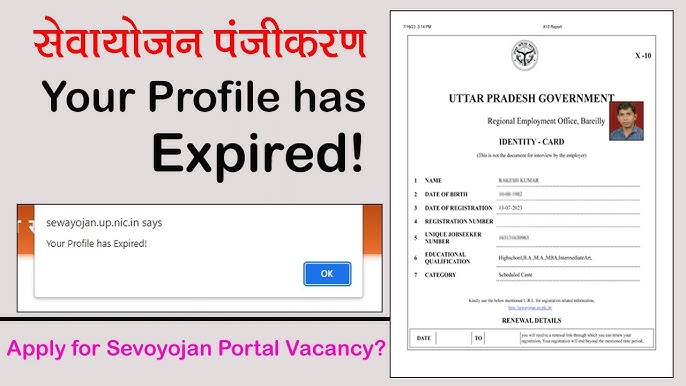Sewayojan Karyalay: A Comprehensive Guide to India’s Employment Mission
India is a nation with one of the largest youth populations in the world, and with this advantage comes a great responsibility: the creation of sustainable employment opportunities. Over the years, both the central and state governments have taken several initiatives to improve the conditions of job seekers by providing platforms where they can connect with potential employers. Among these initiatives, Sewayojan Karyalay (Employment Offices) has stood out as a pioneering effort to bridge the gap between unemployed citizens and job providers. This article provides an in-depth exploration of Sewayojan Karyalay, its historical background, objectives, policy framework, implementation strategies, state-wise benefits, social impact, challenges, success stories, and future prospects.

Introduction to Sewayojan Karyalay
Sewayojan Karyalay refers to the Employment Exchange offices established across various states in India to help citizens, especially the unemployed youth, register themselves and gain access to suitable job opportunities. It acts as a centralized platform that connects job seekers with both government and private sector employers. Over time, it has evolved into a holistic ecosystem for skill development, career guidance, and employment assistance.
The keyword Sewayojan Karyalay is not just a term; it represents a dynamic mechanism aimed at tackling unemployment, supporting women empowerment, boosting rural development, and aligning with India’s broader vision of inclusive social welfare.
Historical Background of Sewayojan Karyalay
The roots of Sewayojan Karyalay can be traced back to the early years of independent India. In the aftermath of Partition and the struggle to rebuild the nation, unemployment became a pressing challenge. Recognizing the urgent need to connect job seekers with employment opportunities, the government established Employment Exchanges under the Employment Exchanges (Compulsory Notification of Vacancies) Act, 1959.
Initially, these offices operated in physical form, where candidates had to visit in person, fill forms, and wait for updates. With the advancement of technology, these employment offices transformed into digital employment portals, enabling registration, job searches, and employer interactions online. Today, many states run dedicated Sewayojan Karyalay websites that provide real-time updates on job fairs, government vacancies, apprenticeship opportunities, and skill training programs.
Objectives of Sewayojan Karyalay
The primary objectives of Sewayojan Karyalay are multifaceted and deeply connected to India’s social and economic development goals:
Employment Generation – To act as a link between employers and unemployed individuals, ensuring fair opportunities for all.
Skill Development – To identify skill gaps and connect candidates with training programs that enhance employability.
Women Empowerment – To promote gender equality by providing dedicated support to women job seekers and entrepreneurs.
Rural Development – To extend employment benefits to rural and semi-urban areas where job opportunities are limited.
Social Welfare – To integrate marginalized groups, differently-abled individuals, and economically weaker sections into the mainstream workforce.
Digital Transformation – To promote transparency and accessibility through online employment portals, reducing dependency on manual processes.
Implementation Framework of Sewayojan Karyalay
The implementation of Sewayojan Karyalay follows a structured policy framework under the guidance of state labor and employment departments. The system includes:
Registration of Job Seekers – Candidates can register themselves at their nearest Sewayojan Karyalay or online portals by providing educational, professional, and personal details.
Employer Registration – Employers from both government and private sectors are encouraged to notify vacancies to Sewayojan Karyalay.
Job Matching – Based on qualifications, skills, and preferences, candidates are matched with available opportunities.
Job Fairs and Employment Drives – States organize regular employment fairs where companies interact with job seekers directly.
Skill Enhancement Workshops – Specialized training programs are offered in collaboration with industrial training institutes and NGOs.
Monitoring and Data Analysis – Advanced digital systems track registration data, employment trends, and labor market requirements to aid in policy-making.
State-Wise Impact of Sewayojan Karyalay
The impact of Sewayojan Karyalay can be observed in different states, each implementing its own strategies to maximize employment benefits.
Uttar Pradesh
Uttar Pradesh has one of the most active Sewayojan Karyalay networks, with an online portal sewayojan.up.nic.in. The portal registers thousands of candidates every day and hosts job fairs across major districts. It has become a lifeline for youth in tier-2 and tier-3 cities.
Bihar
Bihar’s employment exchanges focus on vocational training and skill development. They help migrants returning from other states to find local employment opportunities, thus contributing to rural stability.
Madhya Pradesh
Madhya Pradesh has integrated its Sewayojan Karyalay with entrepreneurship schemes. This allows job seekers to not only look for jobs but also access financial support for startups and self-employment.
Rajasthan
Rajasthan emphasizes women empowerment through its Sewayojan Karyalay initiatives by encouraging female participation in job fairs and offering guidance on government welfare schemes.
Maharashtra
Maharashtra uses digital platforms extensively, providing AI-driven job recommendations and online career counseling services.
Southern States
States like Tamil Nadu, Karnataka, and Kerala have aligned their employment exchanges with global outsourcing and IT opportunities, ensuring that skilled youth can find jobs in international markets.
Role in Women Empowerment
One of the standout aspects of Sewayojan Karyalay is its contribution to women empowerment. Traditionally, women in India have faced barriers in accessing employment due to social, cultural, and structural constraints. Sewayojan Karyalay addresses this issue by:
Providing reserved opportunities for women in government and private sector jobs.
Offering work-from-home job listings to accommodate women balancing family responsibilities.
Supporting entrepreneurship programs where women can receive guidance on starting small businesses.
Connecting women with self-help groups and microfinance schemes to encourage financial independence.
By making women equal stakeholders in the workforce, Sewayojan Karyalay contributes directly to gender equality and inclusive economic growth.
Impact on Rural Development
Rural unemployment is a long-standing challenge in India, often leading to migration and urban overcrowding. Sewayojan Karyalay plays a significant role in mitigating this by:
Organizing rural job fairs that bring employment opportunities directly to villages.
Promoting agro-based industries and rural entrepreneurship.
Connecting candidates with government rural development programs like MGNREGA and skill training initiatives.
Encouraging local employment to reduce the economic and social stress caused by migration.
This approach ensures that the benefits of development are not restricted to cities but reach even the most remote areas.
Social Welfare and Inclusivity
The philosophy behind Sewayojan Karyalay goes beyond just employment. It is rooted in social welfare and inclusivity. Special provisions are made for:
Scheduled Castes, Scheduled Tribes, and OBCs – to ensure representation in the workforce.
Persons with Disabilities (PWDs) – through special job listings and training programs.
Economically Weaker Sections (EWS) – by providing affordable access to skill-building workshops.
Youth from marginalized backgrounds – who are connected with mentorship programs to boost confidence and career prospects.
By catering to diverse social groups, Sewayojan Karyalay ensures balanced and equitable growth.
Success Stories of Sewayojan Karyalay
Numerous success stories across states highlight the transformative role of Sewayojan Karyalay.
In Uttar Pradesh, a young graduate from Gorakhpur found a stable government clerical job through the state’s online Sewayojan portal, helping him support his family and pursue further education.
In Bihar, women from rural areas were trained in tailoring and later connected to garment factories through Sewayojan Karyalay, leading to the creation of sustainable livelihood clusters.
In Madhya Pradesh, an engineering diploma holder registered with Sewayojan Karyalay and was recruited by a private automobile company during a job fair.
In Rajasthan, several women have launched micro-businesses with the guidance of Sewayojan Karyalay, transforming them into entrepreneurs.
These stories illustrate how the initiative is not merely an employment exchange but a life-changing platform.
Challenges Faced by Sewayojan Karyalay
While the impact is noteworthy, Sewayojan Karyalay is not without challenges:
Awareness Gap – Many citizens, especially in remote areas, are unaware of the services offered.
Technological Divide – Limited internet connectivity and digital literacy hinder online registrations.
Quality of Jobs – A significant portion of listed jobs are low-paying or contractual, leading to dissatisfaction.
Employer Participation – Private sector engagement remains inconsistent in some states.
Skill Mismatch – Job seekers often lack the skills required for modern industries, creating an employment gap.
Addressing these challenges is essential to unlock the full potential of Sewayojan Karyalay.
Comparison with Other Employment Schemes
Sewayojan Karyalay can be compared with various other initiatives:
Skill India Mission – Focuses primarily on training, while Sewayojan emphasizes both training and placement.
MGNREGA – Concentrates on rural manual labor, whereas Sewayojan connects candidates to diverse sectors.
Digital India Employment Initiatives – Promote IT-driven jobs, but Sewayojan covers both digital and traditional sectors.
Private Job Portals – Websites like Naukri.com or Indeed cater mainly to urban, educated job seekers, while Sewayojan is inclusive of rural and marginalized groups.
This holistic and inclusive approach makes Sewayojan Karyalay unique in India’s employment ecosystem.
Future Prospects of Sewayojan Karyalay
Looking ahead, the scope of Sewayojan Karyalay is vast:
Integration with AI and Big Data – To provide intelligent job matching and predictive employment trends.
Expansion into International Markets – Helping skilled workers access overseas opportunities.
Collaboration with Startups – Encouraging entrepreneurship through incubation and mentorship support.
Enhanced Women-Focused Programs – With growing emphasis on gender equality, more initiatives for women are expected.
Mobile Accessibility – User-friendly mobile apps for seamless access to services.
Global Partnerships – Collaborating with multinational companies to bring foreign direct employment opportunities.
The future of Sewayojan Karyalay lies in its ability to adapt to changing labor market dynamics and remain relevant in the age of automation and digital transformation.
FAQs on Sewayojan Karyalay
What is Sewayojan Karyalay?
Sewayojan Karyalay is a government-run employment exchange platform that helps job seekers connect with employers, offering registration, job listings, skill training, and career guidance.
How can I register with Sewayojan Karyalay?
You can register online through the official state-specific employment portal or visit your nearest employment exchange office.
Is Sewayojan Karyalay only for government jobs?
No, Sewayojan Karyalay provides access to both government and private sector job opportunities, along with skill development programs.
Does Sewayojan Karyalay help women in employment?
Yes, dedicated programs, job fairs, and entrepreneurship guidance are available for women to promote empowerment and financial independence.
Can rural candidates benefit from Sewayojan Karyalay?
Absolutely. Special rural job fairs, agro-industry opportunities, and skill training initiatives are designed for rural youth.
What challenges does Sewayojan Karyalay face?
Awareness issues, skill mismatches, limited private sector participation, and digital access barriers are some challenges.
What is the future scope of Sewayojan Karyalay?
The future includes AI-based job matching, integration with international markets, mobile accessibility, and stronger partnerships with private industries.
Conclusion
Sewayojan Karyalay has emerged as more than just an employment exchange—it is a comprehensive social welfare initiative that addresses unemployment, fosters women empowerment, strengthens rural development, and contributes to inclusive national growth. While challenges remain, its transformation into a digital-first, inclusive, and skill-oriented platform reflects India’s progressive approach toward employment. With sustained policy support, increased awareness, and technological innovation, Sewayojan Karyalay holds the potential to become a cornerstone of India’s employment framework in the coming decades.






